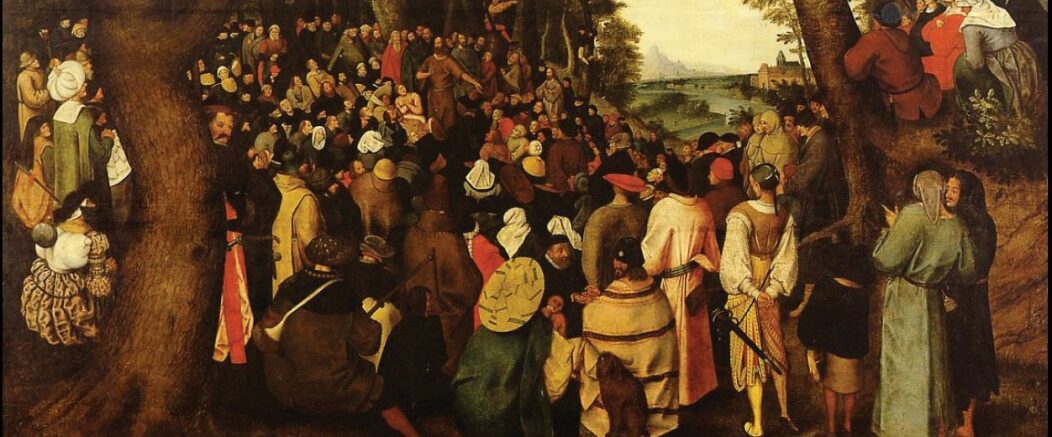Written by Craig Scott and Adam Kuehner for The Reformed Presbyterian Witness.
“Go ye into all the world, and preach the gospel to every creature” (Mark 16:15).
“Go, stand and speak” (Acts 5:20).
Part two in a four-part series on open-air preaching.
If there is one déjà vu moment that makes every street preacher cringe, it is encountering a professing Christian on the street who strongly objects to open-air preaching. Why are you doing this? Didn’t Jesus evangelize people personally, on a one-on-one basis? Is street preaching even biblical? These questions reveal common objections that deserve a thoughtful response. Ours is twofold.
First, we agree that Jesus engaged in relational evangelism (and so do we) by way of friendship and hospitality. Still, relational evangelism is not going to reach everyone. There are myriads of people in our culture who have no outreach-minded Christian friends or neighbors. What about them?
Second, we believe that open-air preaching is both biblical and historical. It is biblical in that it flows from clear scriptural exhortations and examples. It is historical in that it has a robust pedigree, especially within the Reformed tradition.
Biblical Examples
Charles Spurgeon argues “with small fear of refutation, that open-air preaching is as old as preaching itself.”1 Prof. John Murray and Rev. Calvin Cummings concur: “Preaching and teaching under the canopy of heaven is a very ancient practice.”2
The Old Testament contains many examples of open-air preaching. Peter describes Noah as “a preacher of righteousness” (2 Pet. 2:5). This word preacher signifies a public herald. We can imagine Noah standing in the midst of an unbelieving culture, warning vast multitudes of his unsaved countrymen of the coming flood and calling them to flee for safety into God’s ark.
Samuel preached in the open air at Gilgal amid “thunder and rain, by which the Lord rebuked the people and drove them to their knees” (1 Sam 12:18).3 God sent Jonah to preach a message of judgment in the streets of Nineveh, a wicked and violent city, where many thousands of unconverted men, women, and children stood on the brink of a lost eternity. According to Spurgeon, if Jonah “had hired a hall”4 and proclaimed his message indoors, a vast majority of Ninevites would probably never have heard the warning.
God also sent Jeremiah, the weeping prophet, to preach His Word at the “gate of the Lord’s house”—a public place where thousands would hear him (Jer. 7:2). In all likelihood, such prophetic warnings at the city gate were not uncommon (Isa. 29:21; Amos 5:10). Again and again, when foolish sinners “say in their hearts, ‘There is no God’” (Ps. 14:1), the Lord sends His prophets, through whom “Wisdom shouts in the street, she lifts her voice in the square” (Prov. 1:20).
Open-air preaching also appears in the New Testament. John the Baptist lifted up his voice openly and publicly in the wilderness at the river Jordan (Matt. 3:1–2). Jesus Christ—our meek and gentle Savior, who ate with publicans and sinners—also did the same. “Our Lord Himself,” observes Spurgeon, “who is yet more our pattern, delivered the larger proportion of His sermons on the mountain’s side, or by the seashore, or in the streets. Our Lord was to all intents and purposes an open-air preacher. He did not remain silent in the synagogue, but He was equally at home in the field. We have no discourse of His on record delivered in the chapel royal, but we have the Sermon on the Mount, and the sermon in the plain; so that the very earliest and most divine kind of preaching was practised out of doors by Him Who spake as never man spake (John 7:46).”5
Christ loved the lost and desired their salvation. Therefore, in the Great Commission, He commanded His church to preach the gospel to every creature (Mark 16:15). This word preach suggests the imagery of a town crier heralding news in the public square. Hence, on the day of Pentecost, Peter arose and “lifted up his voice,” preaching in the open air to the men of Jerusalem (Acts 2:14). Philip the evangelist traveled to a city of Samaria and publicly heralded Christ to its many residents (Acts 8:5). When Paul visited Athens, he first went to the synagogue, then afterward visited the “market daily,” publicly proclaiming “the good news of Jesus and the resurrection to them” (Acts 17:17–18).
The Bible presents open-air preaching as a normative method of evangelism for God’s people under both testaments.
Continue reading at RPWitness.org…
- Charles Spurgeon, Lectures to My Students (Grand Rapids: Zondervan, 1954), 234. ↩︎
- Biblical Evangelism Today: A Symposium* (Philadelphia: The Committee on Christian Education of the Orthodox Presbyterian Church, 1954) Chapter Six: The Open-Air Meeting. Available online: https://opc.org/chm/BEToday.html#VI ↩︎
- Spurgeon, 234. ↩︎
- Spurgeon, 257. ↩︎
- Spurgeon, 234. ↩︎

